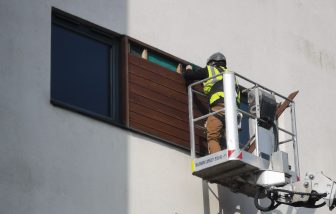 Housebuilders are urging chancellor Jeremy Hunt to get cladding and insulation product manufacturers to contribute to the estimated £3bn bill to make hundreds of risky flats safe.
Housebuilders are urging chancellor Jeremy Hunt to get cladding and insulation product manufacturers to contribute to the estimated £3bn bill to make hundreds of risky flats safe.
The Home Builders Federation (HBF), in its Spring budget representation, is arguing for a levy, or a corporation tax surcharge, so that they can contribute to the post Grenfell remediation bill.
HBF executive chairman, Stewart Baseley, said: “It is only the private home building industry which has been repeatedly targeted for contributions, which likely now total £5bn worth of commitments to buildings they have built and those developed by foreign developers.”
Baseley warned that a slew of 12 different taxes and levies on residential builders, at £4.5bn a year, meant many sites risk becoming unviable affecting the supply of affordable homes.
A modelling exercise by WPI Strategy shows the new building safety levy, to be introduced later this year, will result in an additional development cost of £1,580 per home.
This would spark a two per cent drop in land values resulting in 3,700 fewer homes completed a year with areas of lower land value like the Midlands and the North most affected. The HBF calculates 70,000 affordable homes could be lost over the ten years due to the levy.
SME housebuilders are particularly at risk of pulling out of the sector as rising costs have translated into weaker demand.
The Federation of Master Builders, FMB, chief executive Brian Berry said: “Small, local house builders are facing increasing cost pressures from a range of upcoming regulatory changes and desperately need a change in fortunes”.
The trade body also wants the government in the spring budget tomorrow to prioritise the delivery of new homes.
Berry continued: “We need to see significant reform to the current planning system, which is far too slow and complex, alongside direct funding from government into planning departments.
“If the government wants to deliver its stated ambition to deliver a more diverse housing supply, then it needs to be actively supporting small house builders.”
The National Federation of Builders, NFB, is calling for a small sites register and a medium-sized definition of up to 50 homes to be introduced in local plans.
NFB housing and planning policy head, Rico Wojtulewicz, commented: “Planning reform has not happened as earlier proposed. Therefore, the government needs to have targeted SME policies, or risk losing the sector which does levelling up in practice and trains seven in ten construction apprentices.”
Brokers Hank Zarihs Associates said development finance lenders were concerned that planning delays made it difficult for SME builders to predict their costs accurately.


Aren’t all properties signed off by building control?
Therefore aren’t all faults that of building control for signing off unsafe properties… meaning that local authorities are at fault. If building control is not at fault and they have signed off properties correctly, isn’t it the building regulations that are wrong?
What I’m trying to say is that the Government is at fault one way or another. Stop trying to blame builders and developers because you decide to change the building regs after a property is signed off.
You must be logged in to like or dislike this comments.
Click to login
Don't have an account? Click here to register